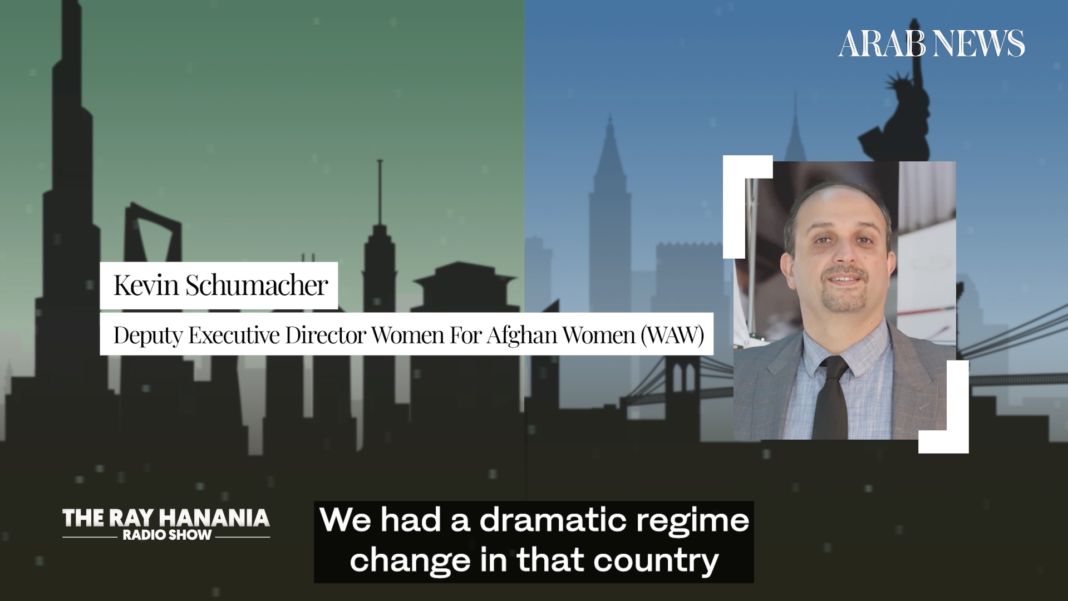Women in Afghanistan are in a dire situation as a result of the US withdrawal from the country last year, an official from leading international aid and advocacy group Women for Afghan Women said on Wednesday.
Of all the people in Afghanistan, it is women who are suffering the most and face the greatest threats, according to Kevin Schumacher, the organization’s deputy executive director.
US President Joe Biden ordered what turned out to be an abrupt withdrawal of American troops from the country in August 2021. Their departure left the way clear for the Taliban — a fanatical religious group that 20 years earlier had provided sanctuary for Al-Qaeda terrorists, including leader Osama bin Laden — to regain control of the country.
Schumacher said the US withdrawal has resulted in a massive reduction in international financial support for the country, the repercussions of which have included increases in levels of illiteracy and poverty, especially among women, who are bottom of the Taliban’s list of priorities.
“I would like us to think about what happened over the past 13 months in Afghanistan,” he said during an appearance on the Ray Hanania Radio Show. “We had a dramatic regime change in that country, as a result of which the international community decided to withdraw.
“All of a sudden, billions of dollars in aid and humanitarian assistance stopped and the international community decided to disengage with that country.
“Now you have hundreds of thousands of professionals, men and women, who used to work with international organizations or they were working in domestic circles but their business was funded directly or indirectly by the international community.
“All of these people, all of a sudden, find themselves in a situation where there is no money coming to the country anymore, there is a government in Kabul that is not recognized internationally, and people really have no idea what tomorrow will bring to them. Many countries decided not to have any diplomatic or business transactions with Afghanistan because so much is uncertain on the ground.”
The US withdrawal has caused financial crisis in Afghanistan, the effects of which have been particularly bad for women, Schumacher said. Prior to the US withdrawal, half of the country’s budget, $6 billion a year, came from international aid and this has been lost, he added, which has caused the support infrastructure women relied on to collapse.
“All of that has translated into a very chaotic financial situation in Afghanistan,” Schumacher said. “A lot of people lost their jobs. A lot of people basically were on the verge of poverty to begin with.
“Afghanistan is one of the poorest countries in Asia. If you look at UN statistics, average Afghans live on under $1,200 a year — and that is on a good day. All of a sudden you have billions of dollars of aid money that is no longer available.”
The situation in the country is now so bad, he added, it is almost impossible to gauge the extent of the Taliban’s oppression of women.
“The problem is no one wants to hear it; nobody follows up on that,” Schumacher said. “The majority of Afghan men, especially those empowered by the Taliban, are not interested in women’s rights.
“And the Taliban administration in general does not seem to care much about women’s rights, even despite the fact that the Taliban’s top leadership seems to be sensitive to this issue.
“So, you have a reality in which a lot of these women are forced into marriage out of poverty or are being sold into marriage or are being sold into hard labor.”
The Taliban administration is only interested in enforcing its strict interpretation of Shariah, without considering the needs of Afghan women, he added. Although the group claims it does not support forced marriages, the social structures that monitored the situation and provided support for women have collapsed.
“In theory, the Taliban insist that they are supportive of woman’s right to choose their husband,” Schumacher said. “But in reality there is no legal mechanism to advocate for women.
“If a woman is victimized by her own family or is forced into marriage, she has no place to go. There is no mediation system. There is no legal system. There is no shelter. Nothing exists because the Taliban authority forced us to shut down all those systems.”
Even before the Taliban came to power, Schumacher said, the UN reported that “70 percent of Afghan women had no access to education and were illiterate.” Now, with women being stripped of their rights completely by the Taliban regime, their future prospects have become even more grim, especially in the realm of education.
The high levels of illiteracy have created massive poverty among many Afghan women, he added, including the widows of men who fought in the various wars of the past 45 years, all the way back to the Soviet invasion in 1979. With no access to education, Schumacher said, they are unable to develop the skills and knowledge to support their families.
The Ray Hanania Radio Show is broadcast on the US Arab Radio Network in Detroit, Washington DC and Chicago and sponsored by Arab News. You can listen to the entire interview by visiting the Ray Hanania Radio Show website at www.ArabNews.com/rayradioshow.




